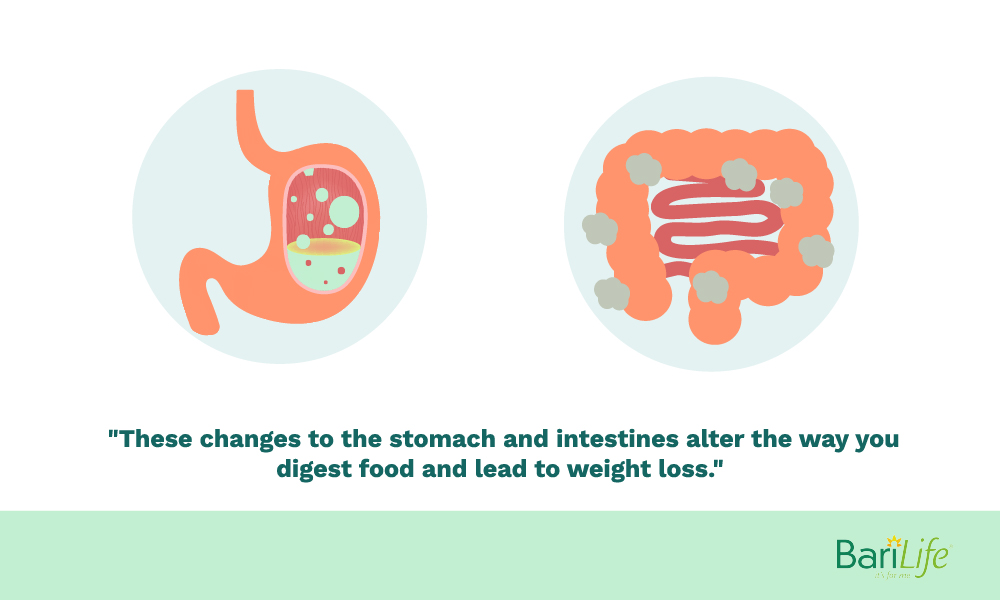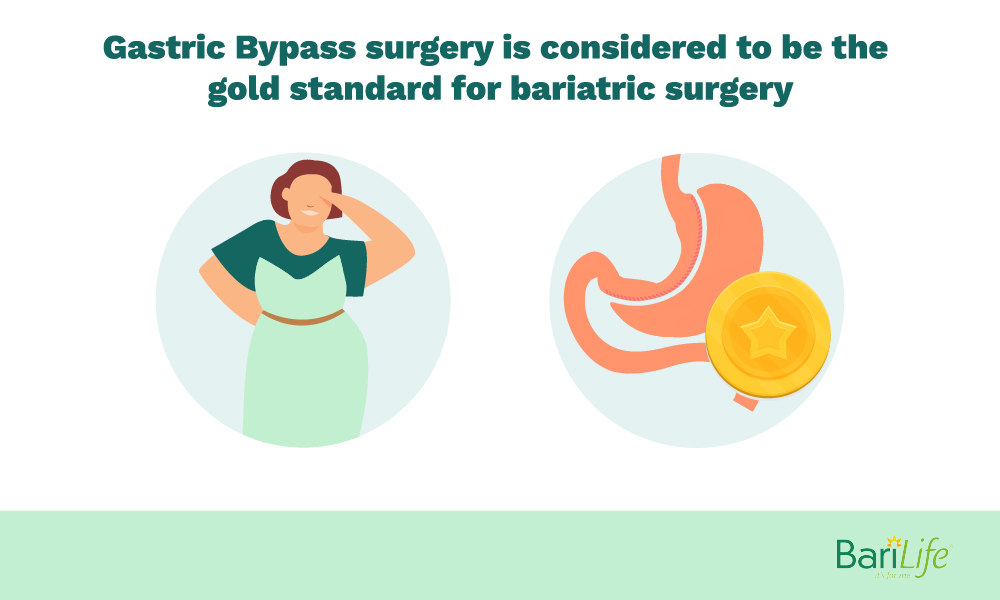ENTER YOUR EMAIL ADDRESS TO UNLOCK
15% OFF
on your first order
Some exclusions apply.
This procedure promotes weight loss because it…
Reduces the amount of food that your stomach can hold Limits the number of calories and nutrients that your body can absorb Changes your gut hormones affecting both appetite and intake Gastric Bypass is a more invasive procedure when compared to other forms of bariatric surgery but, the benefits might just be worth it.
So, Who Qualifies for Bariatric Surgery? People with a BMI greater than 40 or a BMI between 35-40 plus one comorbidity like severe diabetes mellitus, obesity-associated cardiomyopathy, osteoarthritis or severe sleep apnea.
Now that we have introduced the procedure, let’s look at the benefits Gastric bypass surgery and weight loss Roux-en-Y gastric bypass can lead to both short-term and long-term weight loss. Studies show that patients often experience rapid initial weight loss following the procedure, as well as, effective long-term weight loss.
Gastric Bypass is very effective in promoting long-term weight loss and this is one of the reasons it stands out when compared to other forms of bariatric surgery.
Research also shows that the average weight loss associated with the Roux-en-Y gastric bypass is about 70% excess weight, which is about 10% higher than the average weight loss associated with the gastric sleeve.
The total amount of weight you lose depends on your type of surgery and the changes you make in your lifestyle habits.
Medical benefits of gastric bypass surgery
[box]
Gastric bypass can help you to reduce your risk of obesity-related health problems including…
Gastroesophageal reflux disease Heart disease High blood pressure High cholesterol or Hyperlipidemia Relief of musculoskeletal pain Obstructive sleep apnea Type 2 diabetes Stroke Cancer Infertility [/box]
So, you might be thinking that these medical benefits sound similar to those related to other bariatric surgeries… and you would be right. However, one noted difference in Roux-en-Y gastric bypass is related to the amount of time it takes to see results.
Research published in the Texas Heart Institute Journal reveals that it is possible for the blood sugar of a diabetic patient to return to normal following Roux-en-Y gastric bypass before substantial weight loss takes place.
It is estimated that approximately 40% of obese patients with type 2 diabetes go into remission within days or weeks after Roux-en-Y Gastric Bypass.
In most cases of bariatric surgery weight loss needs to occur before significant remission of obesity related diseases. However, that may not always be the case for Gastric Bypass surgery.
One study published in the New England Journal of Medicine highlights that the rates of improvements in HbA1c in the first year following surgery are higher in Gastric Bypass patients compared to Gastric Sleeve patients.
Approximately 37% of sleeve gastrectomy patients and 42% of Roux-en-Y gastric bypass patients with diabetes achieved normal HbA1c test results within one year of their surgeries.
Financial Benefits to gastric bypass surgery So, what about the financial benefits related to bariatric surgery? It’s possible that the high upfront cost of bariatric surgery can be intimidating, but research shows that it can be worth it in the long run (or actually a shorter run than you might think).
One study published in the Obesity Reviews reveals that obesity alone, without any other related diseases or conditions, can cost an additional $1723 dollars a year. If you are thinking that isn’t a lot of money… Just wait until you factor in other conditions like diabetes.
A study published by the Obesity Society estimated the yearly cost for managing diabetes is about $13,243 dollars. Now that’s a significant amount of money.
Historically for bariatric surgery patients, the initial investment averaged about $29,000 for open surgeries in 2004-2007 and $19,000 for laparoscopic surgeries in 2004-2007.
A study conducted by Klein et al. evaluated cost savings associated with surgery in patients with diabetes.
This study found that savings started accruing around the third month following surgery and the total surgery costs were fully recovered on average after 29 months for open surgeries in 2004-2007; and after 26 months for laparoscopic surgeries in 2004-2007.
Benefits related to quality of life after gastric bypass surgeryResearch suggests that quality of life can be improved greatly following Bariatric Surgery.
Results from a study published by Surgery for Obesity and Related Diseases found that 1 year after bariatric surgery the improvement in the quality of life was similar between the Sleeve Gastrectomy and Gastric Bypass.
However, this study found a greater increase in physical functioning after Roux-en-Y Gastric Bypass.
Now let’s take a look at at the risks associated with Gastric Bypass Short-term Complications of Gastric Bypass or abdominal surgery can include: Excessive bleeding Infection Adverse reactions to anesthesia Blood clots Perforation Stricture Lung or breathing problems Leaks in your gastrointestinal system Long-Term Complications of Gastric Bypass can include: Bowel obstruction Dumping syndrome, causing diarrhea, nausea or vomiting Gallstones Hernias Low blood sugar Malnutrition/Nutrient Deficiencies Stomach perforation Ulcers Vomiting One study published by the NCBI found that anywhere from 3% to 20% of patients following Roux-en-Y Gastric Bypass had Long-term complications that could require reoperation.
Risk of Malnutrition/Nutrient Deficiencies After Gastric BypassDue to the nature of the surgery and how it impacts absorption of nutrients it is important to be aware of Nutrient Deficiencies that can occur. Following Roux-en-Y gastric bypass you might experience decreased levels of…
Slight decreases in Zinc, copper, selenium and Vitamin C have also been noted but not significant.
According to a study published by F1000 Medicine , long-term issues with malabsorption of fat, protein-energy malnutrition and micronutrient deficiencies are relatively uncommon and can usually be managed with oral supplements.
And finally, let’s look at the important things you can do to reduce your risk of developing complications Gastric Bypass is an intensive surgery that requires diet and lifestyle modifications before and after surgery. Immediately following surgery you will not be able to have solid foods as your stomach and intestines are trying to heal.
You will then need to follow a special diet plan to progress to solid foods. The need for vitamin and mineral supplements will likely be necessary following surgery.
It is important to work with a team of strong professionals including Physicians and Registered Dietitian to reduce risk of malnutrition/nutrient deficiencies and optimize the effects of the procedure.
Overall, Gastric Bypass surgery can be a challenging but extremely rewarding process. If you are considering Gastric Bypass Surgery, make sure to educate yourself and surround yourself with a smart team of professionals.
In doing so, you will be setting yourself up for a successful weight loss journey.

